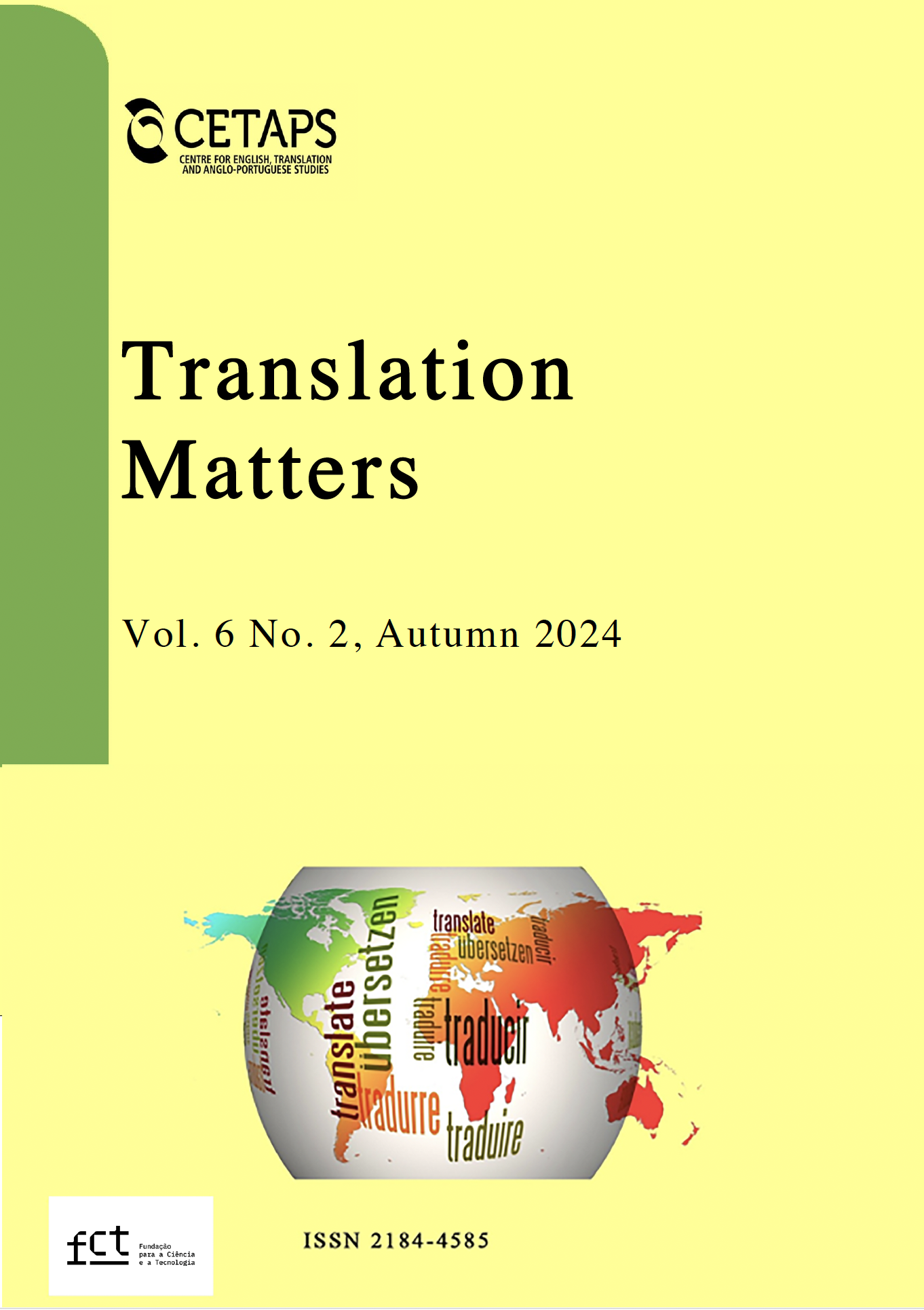Strategies for journalistic translation courses: Toward meaningful pedagogy
Keywords:
Teaching Journalistic Translation, Translation Pedagogy, Translation Portfolio, Assessment, Task Based Approach, Process Oriented ApproachAbstract
This study focuses on teaching journalistic translation courses to undergraduate students in Libya. It advocates a student-centered approach that is process-oriented and taskbased, with a view to creating an active learning environment in which undergraduate students can hone their translation skills, increase their awareness of genre, improve their translation pace, and achieve class objectives and learning outcomes. It contends that such a strategy, complemented with the use of computer-assisted translation (CAT) tools, provides meaningful interactions and enriching learning experiences when utilized successfully. It also suggests that pedagogical strategies, such as a translation portfolio and detailed rubric for comprehensive assessment, along with effective feedback, are important parts of the teaching process.
KEYWORDS: Teaching Journalistic Translation, Translation Pedagogy, Translation Portfolio, Assessment, Task Based Approach, Process Oriented Approach
References
Atari, Omar. (2012). Impediments to Translator Training at Arab Universities. Arab World English Journal, 3(1), 103-127. Retrieved from https://awej.org/images/AllIssues/Volume3/Volume3Number1March2012/6.pdf
Alenezi, A. M. (2020). Task-Based Approach in Teaching Translation: A Case Study in Jouf University. Higher Education Studies, 10 (2), 189-196.
Allen, D., & Tanner, K. (2006). Rubrics: Tools for making learning goals and evaluation criteria explicit for both teachers and learners. CBE—Life Sciences Education, 5(3), 197-203.
Andrade, H. G. 2005. “Teaching With Rubrics: The Good, the Bad, and the Ugly.” College Teaching 53 (1): 27–31. doi:10.3200/CTCH.53.1.27-31
Altarabin, M. (2020). On Translating Arabic and English Media Texts: A Coursebook for Undergraduates. United Kingdom: Cambridge Scholars Publishing.
Baer, Bm., and G. Koby (eds.). (2003). Beyond the Ivory Tower: Rethinking Translation Pedagogy. Amsterdam: John Benjamins.
Candlin, C. N. (1987). Towards Task-Based Learning. In C. Candlin, & D. Murphy (Eds.), Lancaster Practical Papers in English Language Education, Volume 7: Language Learning Tasks (pp. 5-22). Englewood Cliffs, NJ: Prentice Hall.
Dickins, J. et al. (2002). Thinking Arabic Translation: A Course in Translation Method: Arabic and English. London, Routledge.
Dollerup, Cay (1994). “Systematic Feedback in Translation Teaching.” In Teaching Translation and Interpreting 2, Cay Dollerup and Anne Lindegaard (eds), Amsterdam/Philadelphia: Benjamins, 21–132.
Davier, L., & Van Doorslaer, L. (2018). Translation without a source text: methodological issues in news translation. Across Languages and Cultures, 19(2), 241-257. https://doi.org/10.1556/084.2018.19.2.6
Fernández Polo, F., and M. Cal. (2011). “Learning Translation through the Use of Portfolios: Description of an Experience.” Revista d’innovació educativa 7: 44–51.
Giaber, J. (2005). The Increasing Role of Translation in Libyan Politics and Business Activities. International Journal of Arabic-English Studies (IJAES), 6, 181-188. APETAU.
Ghazala H. S. (2012). Translating the Media and Political Idiom: A Textbook for University Students (English-Arabic). Konooz Al-Marifa.
Ghazala H. S. (1995). Translation As Problems and Solutions: A coursebook for university students and trainee translators. ELGA.
Gile, Daniel. (2009). Basic Concepts and Models for Interpreter and Translator Training: Revised Edition. Netherlands, John Benjamins Publishing Company.
Gile, D. (1994). “The Process-Oriented Approach in Translation Training.” In Teaching Translation and Interpreting, eds C. Dollerup and A. Lindegaard, 107–112. Amsterdam and Philadelphia: John Benjamins.
Insai, Sakolkarn. (2013). “Learning Portfolios in Translation Classrooms.” Arab World English Journal, 4 pp. 96-106.
Kiraly, D. C. (1995). Pathways to Translation: Pedagogy and Process. United Kingdom: Kent State University Press.
Kiraly, Don (2000). A Social Constructivist Approach to Translator Education: Empowerment from Theory to Practice. Manchester: St. Jerome Publishing.
Kruger, H. (2008). Training Editors in Universities: Considerations, Challenges and Strategies. In J. Kearns (Ed.), Translator and interpreter training: issues, methods and debates (pp. 39-65). (Continuum studies in translation). Continuum.
Königs, G. (Ed.) (1996). Translation Process(es), META, 41(1). https://doi.org/10.7202/003340ar
Lörscher, W. (1992). Process-oriented research into translation and implications for translation teaching. In Koustas, Jane. La pédagogie de la traduction: questions actuelles et Miscellanées traductologiques. Traduction Terminologie Rédaction (TTR) 5 (1): 145–161.
Li, D. (2006). Translators as Well as Thinkers: Teaching of Journalistic Translation in Hong Kong. Meta, 51(3), 611–619. https://doi.org/10.7202/013566ar
Li, D. (2013). Teaching Business Translation. The Interpreter and Translator Trainer, 7(1), 1-26.
https://doi.org/10.1080/13556509.2013.10798841
Mbeudeu, C. D. (2017). Introducing translation-based activities in teaching English as a foreign language: A step towards the improvement of learners’ accurate use of words and expressions in writing. Istraživanja u pedagogiji, 7(1), 76-89. https://doi/org/10.17810/2015.50
“Pedagogy.” Cambridge Dictionary, dictionary.cambridge.org/dictionary/english/pedagogy. Accessed 3 Oct. 2023.
Pym, A. (1992). Translation Error Analysis and the Interface with Language Teaching. Dollerup, C (Ed.). Loddegaard, A (Ed.). The Teaching of Translation: Training Talent and Experience, (1), pp. 279-288. John Benjamins.
Porter, C. J., Cleland, J. (1995). The Portfolio as a Learning Strategy. United States: Boynton/Cook Publishers.
Skehan, P. (1998). Task-Based Instruction. Annual Review of Applied Linguistics, 18, 268-286.
https://doi.org/10.1017/S0267190500003585.
Sainz, Ma. (1994). “Student-centred corrections of translations”. In Dollerup, C., 8: A. Lindegaard (Eds.), Teaching Translation and Interpreting, 2, 133–143. Amsterdam & Philadelphia: John Benjamins.
Williams, M. (2013). A Holistic-Componential Model for Assessing Translation Student Performance and Competency. Mutatis Mutandis, Vol. 6, No 2, pp. 419–443.
Willis, D., & Willis, J. (1987). Varied activities for variable language. ELT Journal, 41(1), 12-18. https://doi.org/10.1093/elt/41.1.12
Willis, Jane. (1996). A Framework for Task-Based Learning. Longman.
Zanettin, F. (2021). Approaches to News Media Translation. In News Media Translation (pp. 86-132). Cambridge: Cambridge University Press. doi:10.1017/9781108568364.004.
Downloads
Published
Issue
Section
License
Copyright (c) 2024 Translation Matters

This work is licensed under a Creative Commons Attribution 4.0 International License.


